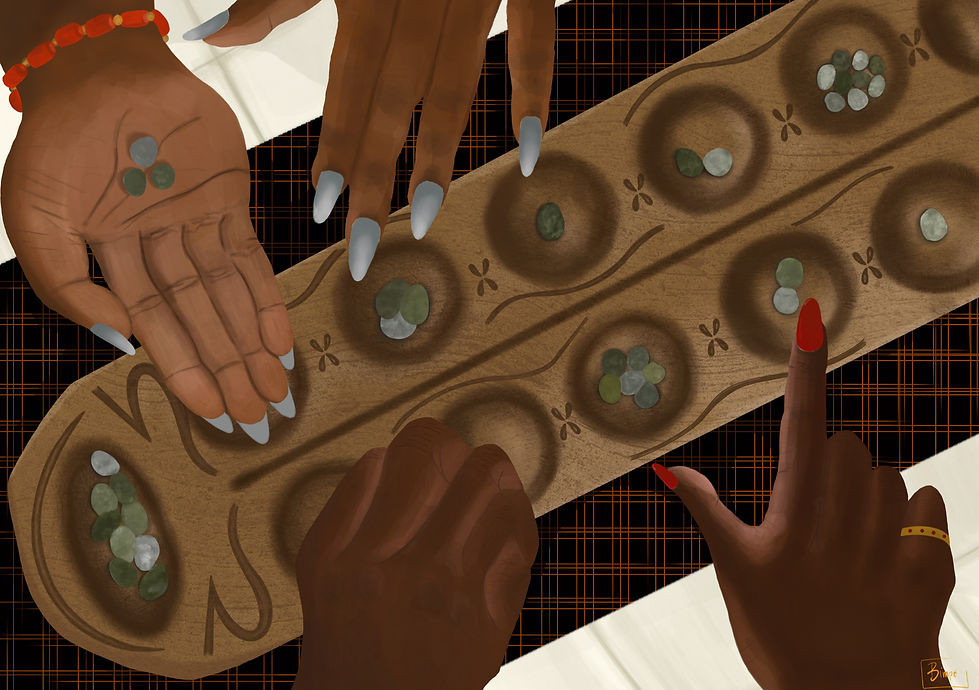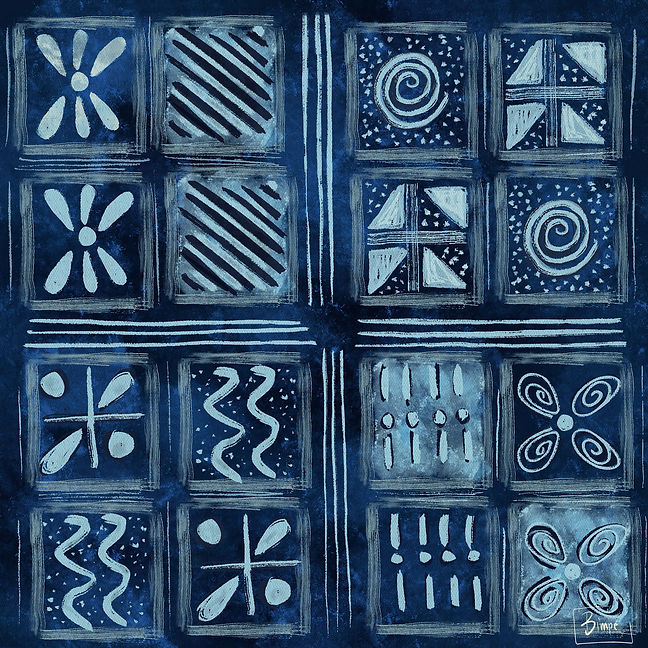Painter | Digital artist | Illustrator

Suya

Small Chops

Grilled Catfish

Ayo



Coral Beads
Ivory Beads
Asoebi

Bring back Iro and Buba

Happy Valentine's Day

Sundays with mum

Adire
Adire - Tie and dye ( Yoruba ). Adire textile orginates from Southwestern Nigeria and is traditionally made using Indigo dye. Adire patterns are created from different techniques including Oniko ( tying the fabric and creating spiral patterns), Eleko ( cassava starch is applied which is a resist and then is later removed) and Alabere ( Adire with a needle, repeated stitches are made in the cloth,the cloth is dyed and then stitches are removed). In the modern day, adire is created using different vibrant colours and is used to create different fashion statements and accessories.

Adire Part 2
Aṣọ-Òkè in Yoruba is translates as 'top cloth'. Aṣọ-Òkè is traditionally hand -woven and worn by Yoruba people from Southwest Nigeria and is made from materials including cotton, silk and rayon. There are different types of this traditional material; Etu is dark indigo with white stripes, Sanyan is made of anaphe wild silk and is a tan /brown colour and Alaari is made from shinning threads and is deep red or purple. Aṣọ-Òkè is traditionally woven using looms made of wood or bamboo. Aṣọ-Òkè is made into agbada for men and Iro and Buba for woman .Aṣọ-Òkè is worn for important cultural events and ceremonies including weddings and funerals. In modern fashion, Aṣọ-Òkè is also used to create different fashion pieces and is now also used to create ready-made apparel.

Aṣọ-Òkè

Aṣọ-Òke ||

Aṣọ-Òkè|||

Y2K Nollywood
Y2K Nollywood . Nollywood ( Nigerian film industry) is one of the biggest film industries in the World. Early 2000s Nollywood is distinct from the music, dramatic sound effects to the makeup and fashion. Early 2000s Nollywood fashion included Cheetah patterned clothes, denim wear , colourful and bold makeup. This illustration , 'Y2K Nollywood' highlights the party scene and fashion of the Nigerian film industry in the early 2000s.

Mo wa lona
Mo wa lona in Yoruba translates to I am on my way ( literally translates to I am on the road). This piece shows three women in Aso Oke on their way, on a motorcycle, rushing to a party.

Ita la wa
Ita la wa in Yoruba translates to We are outside. This illustration shows two aunties on their way too a party, but they hit a bump in the road and the cooler of Jollof opened. Hopefully, the Jollof rice will make it to the party!


Nigerian Charcuterie Board

Ekombi
The Ekombi dance is a traditional dance that is done by Efik people from Calabar, in Cross River state Nigeria. The Ekombi dance is performed at different occasions and the story of Efik people is told through the dance. The dance movement mimic the movement of the sea as Efik people are coastal people and water is very important to them. Efik dancers wear bright , colourful clothes with colourful beads and makeup. The Ekombi dance, is performed along side Efik drummers.

Provisions
A provisions store showing a woman facing her daily hustle.





The Okrika Bride
Okrika is a a town in Rivers State snd Okrika is known for theri exports of palm oil and trading of fish. Okrika brides are dressed in traditional wear with their coral beads, crown and white handkerchiefs.

Love

In love

Ife mi
Ife mi in Yoruba means My love. My illustration shows a vintage picture of a Yoruba couple in their native clothes, in love. The man is wearing an Agbada and the woman is wearing Iro and Buba. I illustrated this piece with black, purple, brown, grey and purple hues of colour.